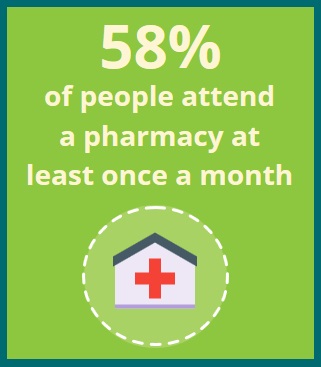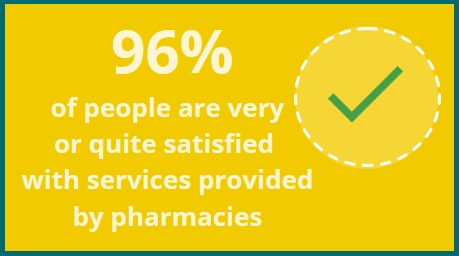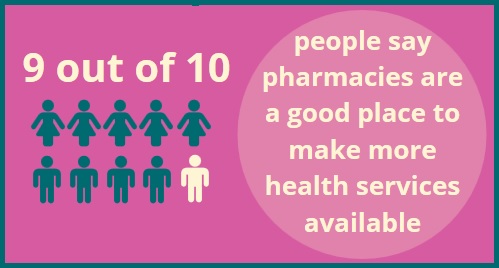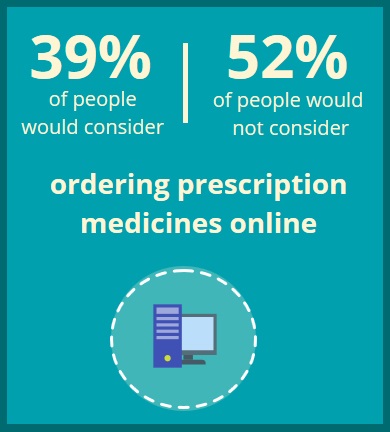Public Survey - Attitudes to Pharmacy in Ireland
The PSI conducted a national survey to gain public opinion of safety and satisfaction in relation to care and services provided by pharmacists in Ireland. In the context of changing healthcare needs, technology development and evolving models of pharmacy service, the PSI believe it is important to consider public opinion to inform the work it carries out on the public’s behalf.
The survey was conducted independently for the PSI by Behaviour & Attitudes, a market research agency. It involved face-to-face interviews with a sample of 1,000 adults. The structure of the sample mirrors the national population profile aged 16+.
An overview of the survey findings:
Who do you go to for advice?
The survey found that 46% of people go to a doctor followed by a quarter to a pharmacist to seek advice on a general healthcare query or minor ailment. 14% look online, another 14% ask a friend or family member, while 1% say they seek 'other' advice.
When asked where people seek advice about a medicine, 47% of people tend first to go to the pharmacist, followed by 32% to a doctor and 13% look online. 5% of people ask a friend or family member and the remaining 3% check the leaflet that comes with the medicine.
How often do you visit a pharmacy?

More than half of the population (58%) are frequent visitors to a pharmacy, indicating they attend a pharmacy, for a number of reasons, more than once a month. A third of a million visit a pharmacy weekly and as many as two million do so monthly. Pharmacy attendance rises dramatically with age, although this is the case on a monthly, but not on a weekly basis.
Frequent attendance is notably less likely in Dublin; 48% of Dubliners say that they visit the pharmacy on a monthly basis, in comparison with more than 60% in each of the other regions. Only 2% of those surveyed say they never attend a pharmacy.
Why attend a pharmacy?
The survey found that 57% of people say the main reason for last attending a pharmacy was to fill a prescription, whether their own or on behalf of a child or someone else. The next most common reason being to purchase over-the-counter medication (24%), followed by toiletries (8%) or to get advice about a health concern or condition (4%).
How satisfied are you?
 Three quarters of adults say that they are very satisfied with the service they receive from their pharmacy. The balance (22%) indicate that they are quite satisfied overall. Just 4% suggests that they are neither satisfied nor dissatisfied, with a negligible number indicating that they are in any way dissatisfied.
Three quarters of adults say that they are very satisfied with the service they receive from their pharmacy. The balance (22%) indicate that they are quite satisfied overall. Just 4% suggests that they are neither satisfied nor dissatisfied, with a negligible number indicating that they are in any way dissatisfied.
Satisfaction is much more apparent amongst older pharmacy users than younger and there is a notable distinction in satisfaction between Dublin and the other regions. This may relate to frequency of use: as seen earlier, Dubliners tend to be somewhat less frequent pharmacy visitors overall.
Feedback on a particular pharmacy service, provision of the flu vaccination by pharmacists, is also available following a short survey undertaken by the PSI during the 2015 flu season. Read those survey results
What do you think about your pharmacy?
The survey found that most people are very positive about their pharmacy, suggesting that pharmacists provide clear information on taking medicines, that they are accessible and available to answer questions, and that the pharmacy is a good place to make more health services available.
The level of agreement of Dubliners tends to be lower and indeed younger adults tend to have less well formed perspectives too. The population structure of the Dublin region is slightly younger but the level of distance of Dubliners from the pharmacist cannot be entirely explained by the age structure within Dublin. More properly it is influenced by a combination of factors.
What about other pharmacy services?

More than 9 in 10 pharmacy users believe that the pharmacy is a good place to make more healthcare services available.
There is interest in being able to get more health promotion advice from pharmacists (89%), cholesterol checks (88%), blood pressure checks (88%), appointments with pharmacists to speak in private about a patient’s medicines (87%), and diabetes checks (87%).
There is also high levels of interest in pharmacist led health clinics for obesity and weight management (84%) and for chronic disease management, such as asthma and diabetes (81%), and for vaccinations, such as travel and childhood vaccinations, (81%) being available from pharmacists.
What influences you availing of pharmacy-delivered services?
There were very high scores across each of the five factors proposed. Trust in the pharmacist and access rated highest, followed by acknowledgement of pharmacists as experts in medicines, long and convenient pharmacy opening hours and lastly by cost of service.
Would you consider ordering prescription medicines online?
 Sale of prescription medicines over the internet is currently prohibited in Ireland. People were asked to consider whether they would order a prescription medicine online if the service was operated by a regulated internet pharmacy.
Sale of prescription medicines over the internet is currently prohibited in Ireland. People were asked to consider whether they would order a prescription medicine online if the service was operated by a regulated internet pharmacy.
Attitudes differ substantially, predominantly by age, with younger and Dublin-based adults much keener to consider online prescription ordering as an option. 39% would consider purchasing online. 52% of people said they would not likely or not at all consider ordering prescription medicines online.
The sale of other non-prescription (over the counter) medicines is allowed online since June 2015 after introduction of European wide legislation. It requires that retailers register with the PSI and make particular information available to the consumer on their website. The PSI has produced an information leaflet with more details for consumers on this topic.
What about any bad experiences and making a complaint?
Survey results show that few people have ever had a poor experience in a pharmacy; 96% say they have had no experience that would give rise to unhappiness or a complaint in relation to a pharmacy interaction. Where someone said they had a bad experience, roughly half (2%) indicate that they had complained to the pharmacy and the balance (2%) that they should have complained but at the time they had done nothing. One person advised that they had made a complaint to the relevant body, the PSI, as pharmacy regulator.